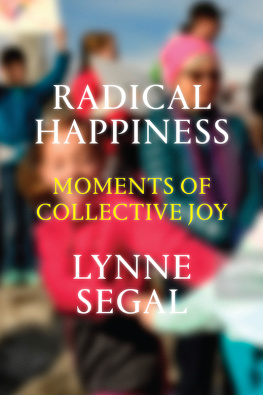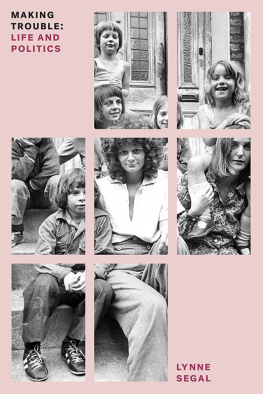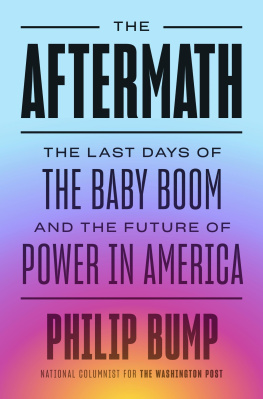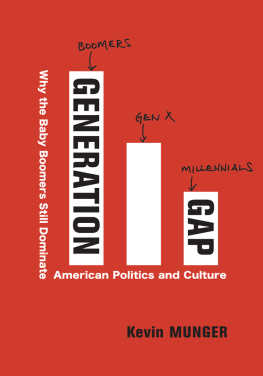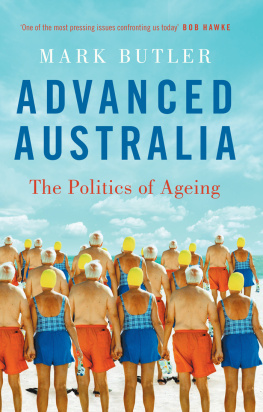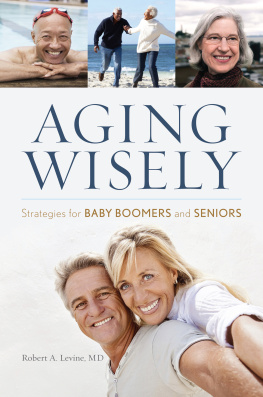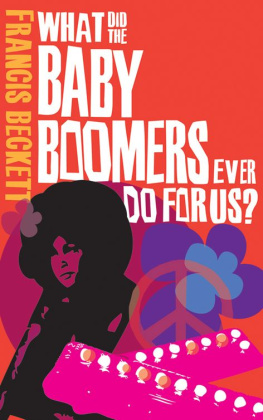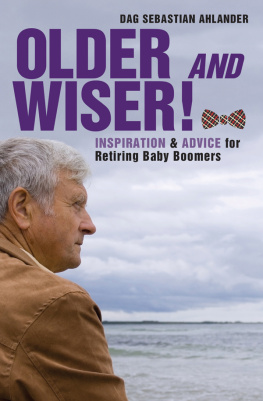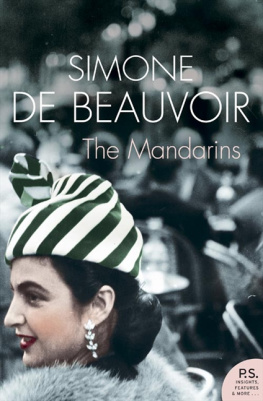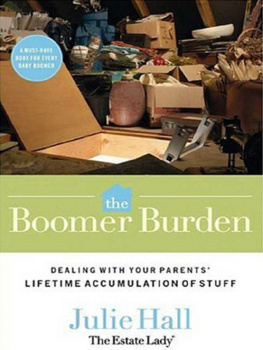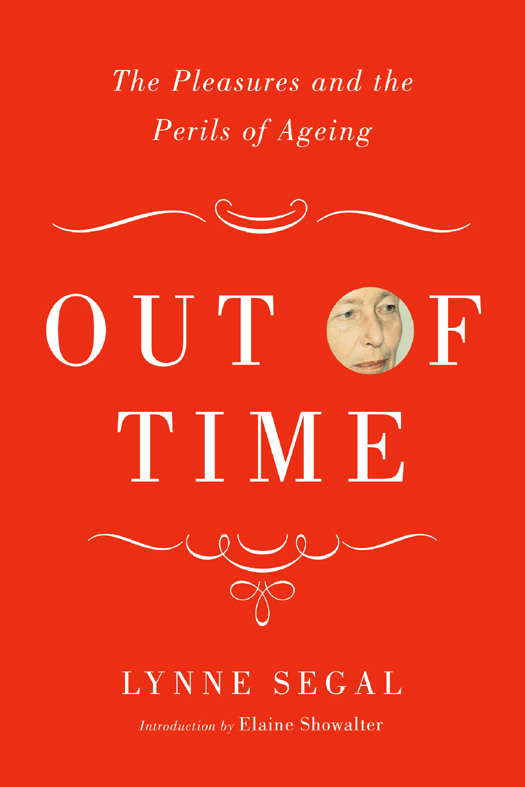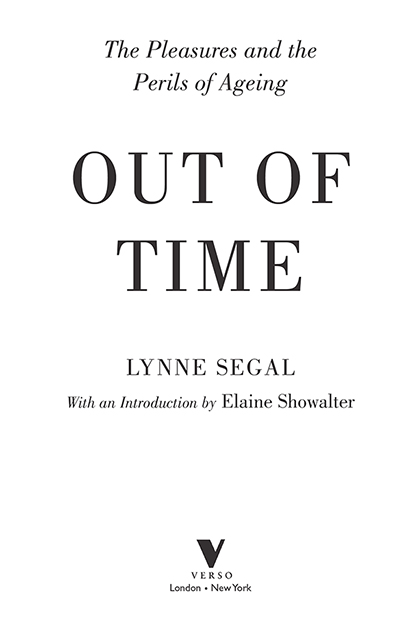First published by Verso 2013
Lynne Segal 2013
Introduction Elaine Showalter 2013
All rights reserved
The moral rights of the authors have been asserted
Verso
UK: 6 Meard Street, London W1F 0EG
US: 20 Jay Street, Suite 1010, Brooklyn, NY 11201
www.versobooks.com
Verso is the imprint of New Left Books
ISBN (US): 9781781681954
ISBN (UK): 9781781685044
British Library Cataloguing in Publication Data
A catalogue record for this book is available from the British Library
Library of Congress Cataloging-in-Publication Data
Segal, Lynne.
Out of time : the pleasures and perils of ageing / Lynne Segal ; with an introduction by Elaine Showalter.
pages cm
ISBN 978-1-78168-139-8 (hardback)
1. Old age. 2. Aging. 3. Intergenerational relations. I. Title.
HQ1061.S418 2013
305.26 dc23
2013019104
v3.1
For Agnes, amonn and Zim
Contents
Acknowledgements
Since this book is about affirming life, whatever our age, acknowledging the necessity and significance of the love, friendship and support of those around me is part of its purpose. I am grateful to Verso for publishing my reflections on old age, when I feared that my topic might frighten everyone away. In particular I have benefited from the editing skills of Leo Hollis, determined to keep the writing as precise and succinct as possible, as well as from the wise advice of my own personal editor and friend, Sarah Benton. I am also thankful for the support of my agent, Rachel Calder, for stepping in just when I needed her. Above all, I want to express my love and gratitude to all those who have given me confidence or in other ways assisted me in my writing. One way and another, up close or from a distance, these include Agnes Bols, amonn McKeown, Joo Manuel de Oliveira, Stine Svensen, Mirjam Hadar Meerschwam, Ross Poole, Paddy Maynes, Kjetil Berge, Nick Davidson, Mandy Merck, Catherine Hall, Stuart Hall, Judith Butler, Wendy Brown, Nel Druce, Bill Schwarz, Cora Caplan, Sally Alexander, Barbara Taylor, Stephen Frosh, Peter Osborne, Lisa Baraitser, Wencke Muhleisen, Mehmet Ali Dikerdem, Leonore Tiefer, Sheila Rowbotham, Maria Aristedemou, Amber Jacobs, Mustafa Gur, Daniel Monk, Matt Cook, Uri Hadar and Misha Hadar, Marina Warner, Mark Martin, and Zimri, Graeme and Barbara Segal.
Introduction
by Elaine Showalter
Its not easy to come out as an old person, especially as an old woman. While the coming-out process is usually seen as the public acknowledgment of an attribute that might otherwise stay invisible, such as being gay, and promises acceptance into a welcoming community, identifying yourself as old is to admit something everyone can see, and is thus somehow more shaming, carrying more of a stigma. Were supposed to deny being old; it is seen as an insulting, or at least unwelcome, self-description, unless jocular and well padded with euphemisms: senior citizen, oldie. Ageing is a process, a matter of degree rather than a fixed identity.
Like being fat, being old also has its own kind of secret closet. The late literary critic and gay theorist Eve Sedgwick gave a famous conference talk in which she came out as fat, and described her fat dream of entering a closet full of luscious clothes, all in her size, and then seeing that their label was a pink triangle. Old people have age dreams as well. In her study La Vieillesse (The Coming of Age, 1970), written when she was only fifty-four, Simone de Beauvoir confessed that often in my sleep I dream that Im fifty-four, I awake, and find Im only thirty. What a terrible nightmare I had, says the woman who thinks shes awake. In a dream you are never eighty, wrote Anne Sexton.
Beauvoir quickly discovered that old age was a forbidden subject. What a furious outcry I raised when I offended against this taboo great numbers of people, particularly old people, told me kindly or angrily, but always at great length that old age simply does not exist. There are a hundred ways to deny, defy, or avoid the fact of ageing, from strenuous exercise and cosmetic surgery to relentless workaholism and maniacal activity. For some, theres the philosophy of agelessness, which Catherine Mayer calls amortality or living agelessly. Recent polls find that most adults over fifty feel at least ten years younger, while those over sixty-five feel twenty years younger. How can a seventeen-year-old like me suddenly be eighty-one? the scientist Lewis Wolpert asks ruefully in his book Youre Looking Very Well.
Since the second wave of the womens movement began in the late 1960s and 1970s, feminists have re-examined the myths and stereotypes, the stigmas and truisms of every phase of the life cycle. Our generation did not grow up with feminism, but came to it when we were already in our twenties and thirties, and our first bulletins were about issues facing young women menstruation, sexuality, the body, lifestyles. Germaine Greer famously challenged the ancient taboo about menstruation by asking women if they had tasted their own menstrual blood. If not, baby, she taunted, you havent come a very long way. Kate Millett raised consciousness about the sexual politics of literature and life. The poet Adrienne Rich placed motherhood, with all its ambivalence and conflict, in a feminist context. Books about maternity and infants were followed by books about parenting teenagers, then about living with empty nests. Books about marriage were followed by books about divorce, changes in sexual identity, or living alone. Many of our icons died young, and did not or would not face the problem of time. Sylvia Plath died at thirty, Anne Sexton at forty-six, Angela Carter at fifty-two. As a young woman in 1972, Susan Sontag maintained that growing old is mainly an ordeal of the imagination.
But those who lived longer moved on to darker subjects. There were feminist studies of the experience of menopause; and, inexorably, memoirs of caretaking, loss, and death. The feminist bookshelf has expanded to hold books on feminists getting older by Betty Friedan, Gloria Steinem, Germaine Greer, Carolyn Heilbrun, Jane Miller, May Sarton, and Irma Kurtz; poems of mourning in old age by Elaine Feinstein and Ruth Fainlight; grief and widowhood memoirs by Joan Didion and Joyce Carol Oates. We even have records and meditations on feminism and dying from Eve Sedgwick and Ruth Picardie; rages against the night from Susan Sontag; and graceful goodbyes from Wendy Wasserstein and Nora Ephron.
Lynne Segal has lived through every phase, literary and political, of the womens movement as an activist, a scholar, a teacher, and a writer. In 2007, in her autobiography Making Trouble (2007), Segal described herself as a reluctantly ageing woman, and mused about the need for a feminist sexual politics of ageing. But the timing was wrong. She was cautioned by some of her friends to avoid thinking, let alone writing, of my generation as old. Now in Out of Time, she has written the big book we have been waiting for on the psychology and politics of ageing, for both women and men. The subjects that used to be unmentionable are now urgent and essential to discuss, and we can be fairly certain that old taboos are already collapsing, often indeed that the floodgates are opening. In Segals philosophical take on old age, the self never ages, although the body changes and the culture evolves. Ageing is also timeless, not simply linear, nor any simple discrete process when, in our minds we race around, moving seamlessly between childhood, old age, and back again. What really matters, she argues, is neither the sociology nor the biology of ageing, but the narrative of the self, the stories we tell ourselves of how to


